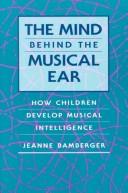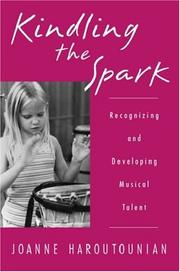| Listing 1 - 10 of 12 | << page >> |
Sort by
|
Book
ISBN: 3921029635 Year: 1979 Publisher: Hamburg Wagner
Abstract | Keywords | Export | Availability | Bookmark
 Loading...
Loading...Choose an application
- Reference Manager
- EndNote
- RefWorks (Direct export to RefWorks)
Musical ability --- Musical ability. --- Testing. --- Music --- Ability, Musical --- Competence, Musical --- Musical competence --- Musical talent --- Ability --- Testing --- Ability testing
Book
ISBN: 1283259370 9786613259370 9048515084 9789048515080 9781283259378 9789048526987 9048526981 9790000000000 9789056296896 Year: 2011 Publisher: Amsterdam : Vossiuspers UvA,
Abstract | Keywords | Export | Availability | Bookmark
 Loading...
Loading...Choose an application
- Reference Manager
- EndNote
- RefWorks (Direct export to RefWorks)
Since infancy we humans have had a high perceptual sensitivity to both the melodic, rhythmic and dynamic aspects of speech and music. It is, as far as we know, a uniquely human talent for perceiving, interpreting and appreciating music, dating as far back before words were spoken, or even invented. Music has an intriguing way with our hearing, our memory, our emotions and our expectations. As a listener we are often unaware of the active role we play when determining what music is exciting, comforting or exciting. Consequently, listening is not happening in the outside world of sounding music,
Music --- Cognition. --- Musical ability. --- Musical perception. --- Auditory perception --- Ability, Musical --- Competence, Musical --- Musical competence --- Musical talent --- Ability --- Psychology --- Music psychology --- Psychological aspects. --- Psychological aspects
Book
ISBN: 0191643858 1306224500 9780191643859 9780199589838 0199589836 019166331X Year: 2014 Publisher: Oxford : Oxford University Press,
Abstract | Keywords | Export | Availability | Bookmark
 Loading...
Loading...Choose an application
- Reference Manager
- EndNote
- RefWorks (Direct export to RefWorks)
Throughout her long and distinguished career, Jeanne Bamberger conducted countless case studies analysing musical development and creativity within the classroom environment. 'Discovering the Musical Mind' draws together these classic studies, and offers the chance to revisit and reconsider some of the conclusions she drew at the time.
Music --- Musical ability. --- Musical ability in children. --- Music psychology --- Ability in children --- Ability, Musical --- Competence, Musical --- Musical competence --- Musical talent --- Ability --- Education, Musical --- Music education --- Musical education --- Musical instruction --- Instruction and study. --- Psychological aspects. --- Psychology --- Study and teaching
Book
ISBN: 0416713009 Year: 1981 Publisher: London Methuen
Abstract | Keywords | Export | Availability | Bookmark
 Loading...
Loading...Choose an application
- Reference Manager
- EndNote
- RefWorks (Direct export to RefWorks)
Musical ability --- Music --- 571 --- 159.9:7 --- 159.9:7 Psychologie van de kunst --- Psychologie van de kunst --- Music psychology --- Ability, Musical --- Competence, Musical --- Musical competence --- Musical talent --- Ability --- Psychological aspects --- Muziekpsychologie --- Psychology

ISBN: 0674576071 Year: 1991 Publisher: Cambridge (MA) ; London : Harvard University Press,
Abstract | Keywords | Export | Availability | Bookmark
 Loading...
Loading...Choose an application
- Reference Manager
- EndNote
- RefWorks (Direct export to RefWorks)
620 --- Musical ability --- Music --- -Art music --- Art music, Western --- Classical music --- Musical compositions --- Musical works --- Serious music --- Western art music --- Western music (Western countries) --- Ability, Musical --- Competence, Musical --- Musical competence --- Musical talent --- Ability --- Muziekpedagogie --- Psychological aspects --- -Muziekpedagogie --- -Ability, Musical --- Art music --- Music psychology --- Psychology
Multi
ISBN: 9781107052963 9781107686397 9781107281868 1107052963 1107686393 1108514731 1108505791 1107281865 Year: 2017 Publisher: Cambridge Cambridge University Press
Abstract | Keywords | Export | Availability | Bookmark
 Loading...
Loading...Choose an application
- Reference Manager
- EndNote
- RefWorks (Direct export to RefWorks)
The Psychology of Musical Development provides an up-to-date and comprehensive account of the latest theory, empirical research and applications in the study of musical development, an important and emerging field of music psychology. After considering how people now engage with music in the digital world, and reviewing current advances in developmental and music psychology, Hargreaves and Lamont compare ten major theoretical approaches in this field - including cognitive stage models and neuroscientific, ecological and social cognitive approaches - and assess how successfully each of these deals with five critical theoretical issues. Individual chapters deal next with cognition, perception and learning; social development; environmental influences on ability, achievement and motivation; identity, personality and lifestyle; affect and emotion; and well-being and health. With an emphasis on practical applications throughout, this book will be essential reading for students and scholars of music psychology, developmental psychology, music education and music therapy.
Music --- Developmental psychology --- Musical ability --- Musique --- Psychologie du développement --- Aptitude musicale --- Psychological aspects --- Aspect psychologique --- Psychology --- 611 --- Ability, Musical --- Competence, Musical --- Musical competence --- Musical talent --- Ability --- Development (Psychology) --- Developmental psychobiology --- Life cycle, Human --- Naslagwerken - Algemeen onderzoek --- Psychologie du développement. --- Aptitude musicale. --- Aspect psychologique. --- Naslagwerken muziekpedagogiek en didactiek - algemeen onderzoek --- muziekpsychologie --- esthetica --- muziek --- ontwikkelingspsychologie --- Developmental psychology. --- Musical ability. --- Psychological aspects. --- Music psychology

ISBN: 0198523335 0198523327 Year: 2003 Publisher: Oxford University Press
Abstract | Keywords | Export | Availability | Bookmark
 Loading...
Loading...Choose an application
- Reference Manager
- EndNote
- RefWorks (Direct export to RefWorks)
Don d'Irène Deliège
Musique --- Muziek --- Musical ability. --- Musique, Aptitude pour la --- Child development. --- Music --- Developmental psychology. --- Enfants --- Psychologie du développement --- Psychological aspects. --- Physiological aspects. --- Physiological effect. --- Développement --- Aspect psychologique --- Aspect physiologique --- Effets physiologiques --- Developmental psychology --- Musical ability --- Music psychology --- Ability, Musical --- Competence, Musical --- Musical competence --- Musical talent --- Ability --- Development (Psychology) --- Developmental psychobiology --- Psychology --- Life cycle, Human --- Psychological aspects --- Essays --- Jeugd --- Pedagogie --- Psychologie --- Akoestiek --- Anatomie --- Fysiologie
Book
ISBN: 0262037459 0262344548 9780262344548 9780262037457 0262344556 Year: 2018 Publisher: Cambridge, Massachusetts : The MIT Press,
Abstract | Keywords | Export | Availability | Bookmark
 Loading...
Loading...Choose an application
- Reference Manager
- EndNote
- RefWorks (Direct export to RefWorks)
Interdisciplinary perspectives on the capacity to perceive, appreciate, and make music. Research shows that all humans have a predisposition for music, just as they do for language. All of us can perceive and enjoy music, even if we can't carry a tune and consider ourselves "unmusical." This volume offers interdisciplinary perspectives on the capacity to perceive, appreciate, and make music. Scholars from biology, musicology, neurology, genetics, computer science, anthropology, psychology, and other fields consider what music is for and why every human culture has it; whether musicality is a uniquely human capacity; and what biological and cognitive mechanisms underlie it. Contributors outline a research program in musicality, and discuss issues in studying the evolution of music; consider principles, constraints, and theories of origins; review musicality from cross-cultural, cross-species, and cross-domain perspectives; discuss the computational modeling of animal song and creativity; and offer a historical context for the study of musicality. The volume aims to identify the basic neurocognitive mechanisms that constitute musicality (and effective ways to study these in human and nonhuman animals) and to develop a method for analyzing musical phenotypes that point to the biological basis of musicality.
Music --- Musical ability --- Origin --- ARTS/Music & Sound Studies --- LINGUISTICS & LANGUAGE/General --- COGNITIVE SCIENCES/General --- Ability, Musical --- Competence, Musical --- Musical competence --- Musical talent --- Ability --- Art music --- Art music, Western --- Classical music --- Musical compositions --- Musical works --- Serious music --- Western art music --- Western music (Western countries)

ISBN: 0195129482 9780195129489 9780195156386 0195156382 0198035519 9780198035510 1280502495 9781280502491 0195156382 9780198035510 0190288795 9780190288792 0195303512 9780195303513 1602568030 9781602568037 0197561969 9786610502493 6610502498 9780197561966 Year: 2002 Publisher: Oxford ; New York : Oxford University Press,
Abstract | Keywords | Export | Availability | Bookmark
 Loading...
Loading...Choose an application
- Reference Manager
- EndNote
- RefWorks (Direct export to RefWorks)
Joanne Haroutounian uses her experience as teacher, researcher, and parent to clarify central issues concerning talent recognition and development in a way that will easily appeal to a wide audience. The book describes the different stages of development in musical training, including guidelines for finding a suitable teacher at different levels, social and psychological aspects that impact musical training, and research on talent development by ages and stages from infancy and preschool years through the teen years. In this text the author offers a synthesis of the research and resources on musical talent - what it is, how to recognise it and how to nurture and develop it.
Music --- Instruction and study --- Psychological aspects --- Musical ability --- Musical ability. --- Ability, Musical --- Competence, Musical --- Musical competence --- Musical talent --- Ability --- Art music --- Art music, Western --- Classical music --- Musical compositions --- Musical works --- Serious music --- Western art music --- Western music (Western countries) --- Psychological aspects.
Book
ISBN: 0199342059 0199937052 0199937060 9780199937066 9780199937042 0199937044 9780199937059 9780199342051 9781299819016 129981901X Year: 2013 Publisher: New York : Oxford University Press,
Abstract | Keywords | Export | Availability | Bookmark
 Loading...
Loading...Choose an application
- Reference Manager
- EndNote
- RefWorks (Direct export to RefWorks)
The Mind's Ear offers a unique approach to stimulating the musical imagination and inspiring creativity, as well as providing detailed exercises aimed at improving the ability to read and imagine music in silence, in the ""mind's ear."" Modeling his exercises on those used in theater games and acting classes, and drawing upon years of experience with improvisation and composition, Bruce Adolphe has written a compelling, valuable, and practical guide to musical creativity that can benefit music students at all levels and help music teachers be more effective and inspiring. The book also provide
Ear training. --- Musical ability. --- Creation (Literary, artistic, etc.) --- Creative ability in art --- Creative ability in literature --- Art --- Imagination --- Inspiration --- Literature --- Creative ability --- Originality --- Ability, Musical --- Competence, Musical --- Musical competence --- Musical talent --- Ability --- Music --- Musical dictation --- Instruction and study --- Ear training --- Musical ability
| Listing 1 - 10 of 12 | << page >> |
Sort by
|

 Search
Search Feedback
Feedback About UniCat
About UniCat  Help
Help News
News